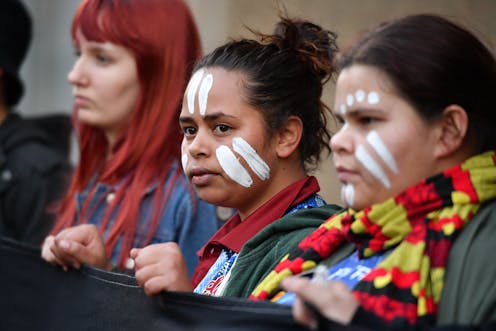Indigenous recognition in our Constitution matters – and will need greater political will to achieve
- Written by Dominic O'Sullivan, Associate Professor in Political Science, Charles Sturt University

Constitutional recognition is difficult to achieve. It requires a referendum to amend the Australian Constitution to receive majority support in a majority of states.
Prime Minister Malcolm Turnbull’s view is that for a proposal to succeed it would require “minimal or at least tepid opposition”.
The Australian Constitution does not mention Indigenous people. It does not acknowledge their prior occupancy, nor recognise any pre-existing aboriginal rights as the Canadian Constitution does, for example.
In 2015, Turnbull and Opposition Leader Bill Shorten appointed a Referendum Council to consider options for constitutional recognition of Australia’s First Peoples. Turnbull’s intention was a symbolic, though politically inconsequential, amendment.
The tension is that Indigenous peoples’ claims to substantive political voice transcend the symbolic. Transcending the symbolic is intended to change political relationships and power structures. It introduces very different ideas about what it means for an Indigenous person to enjoy substantive citizenship of a liberal democratic state.
Constitutions are symbolic, but they are also deeply imbued with political values. They tell us what it means to be part of the state; what it means to be a citizen. They tell us who really belongs and who doesn’t.
Section 25 of the Constitution is explicit:
… if by the law of any state all persons of any race are disqualified from voting at elections for the more numerous house of the parliament of the state, then, in reckoning the number of the people of the state or of the Commonwealth, persons of that race resident in that state shall not be counted.
Liberal societies exclude to protect what the more powerful population groups hold in common. They exclude for fear of difference; for fear that another’s claim to a share in political authority might diminish their own. They exclude through the denial of history to make another’s claim seem unreasonable.
They also exclude in the language they use to frame democracy. For Turnbull, the recommendation of the Referendum Council to enshrine an Indigenous voice “to parliament” in the Constitution was “contrary to equality and citizenship”.
Turnbull’s is a classical liberal position. One may participate in public affairs, but only as an individual and only if one’s individual perspective is not developed through a distinctive cultural lens.
There is a fundamental clash with the council’s Uluru Statement from the Heart. Although contested, it remains an authoritative and comprehensive expression of Indigenous opinion on the form that constitutional recognition ought to take. It is also an important statement about what recognition should achieve:
Makarrata is the culmination of our agenda: the coming together after a struggle. It captures our aspirations for a fair and truthful relationship with the Australian people and a better future for our children based on justice and self-determination.
The argument for an Indigenous voice does not diminish others’ political voice. It does not disturb the liberal presumption of “one person, one vote”. It is not as far-reaching as New Zealand’s guaranteed Indigenous representation in parliament. Nor is it as far-reaching as Indigenous claims to independent nationhood in North America.
Objections grounded in liberal inclusivity, “equality and citizenship” bring to mind the Canadian political scientist James Tully’s alternative question:
What recourses exist in political theory for thinking about non-colonial relations between indigenous and non-indigenous peoples?
There may be scope for a counter-argument to be made in Turnbull’s own philosophical terms. That may be recognition of a kind that Indigenous peoples might find acceptable and that others might also support, depending on how effectively the idea of an Indigenous voice to parliament can be argued as one that is fundamentally democratic.
Ideally, it would be presented as an idea that will make liberal democracy work better; one that allows people to think not so much about “one vote of equal value”, but one voice of equal value.
Read more: Why guaranteed Indigenous seats in parliament could ease inequality
Equal political voice means that all people may participate in decision-making. Further, substantive equality is achievable only when people listen to others’ perspectives and, when they disagree, make their arguments in ways that at least make sense to the one whose position is rejected. This is rarely an Indigenous experience of democracy.
As just one example, an Indigenous representative body may argue that parliament ought to change the date of the Australia Day. The need to respond to that body, specifically, would be democratically important.
The government speaks to quite different constituencies with quite different motivations when removing a local council’s right to hold citizenship ceremonies as retribution for changing the date of local Australia Day celebrations.
A requirement to speak directly and respectfully to Indigenous people would raise the tone and quality of debate. Democracy would be strengthened.
People have fundamentally different ideas about the nation that the Constitution establishes. They differ on how people should be included in that nation, and how democracy should be inclusive or, indeed, whether substantive inclusivity should even be a political objective. Recognition is therefore difficult to achieve.
Authors: Dominic O'Sullivan, Associate Professor in Political Science, Charles Sturt University





